Feed aggregator
The Sword & Planet Tales of Ralph Milne Farley
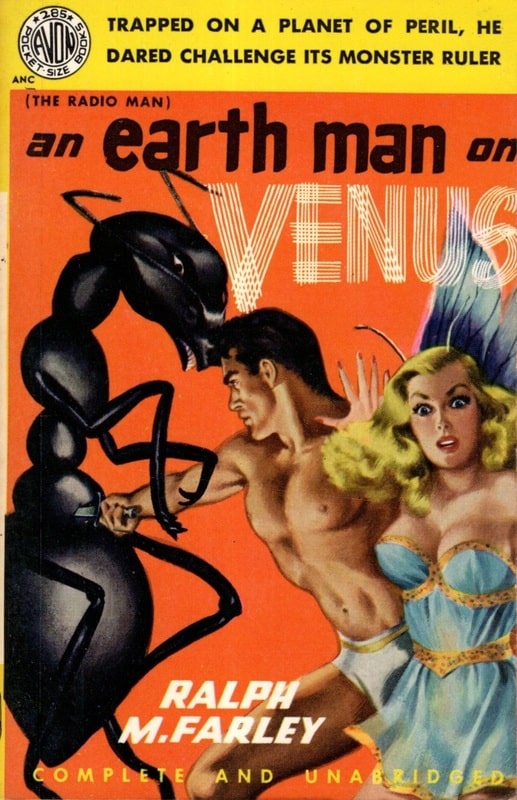
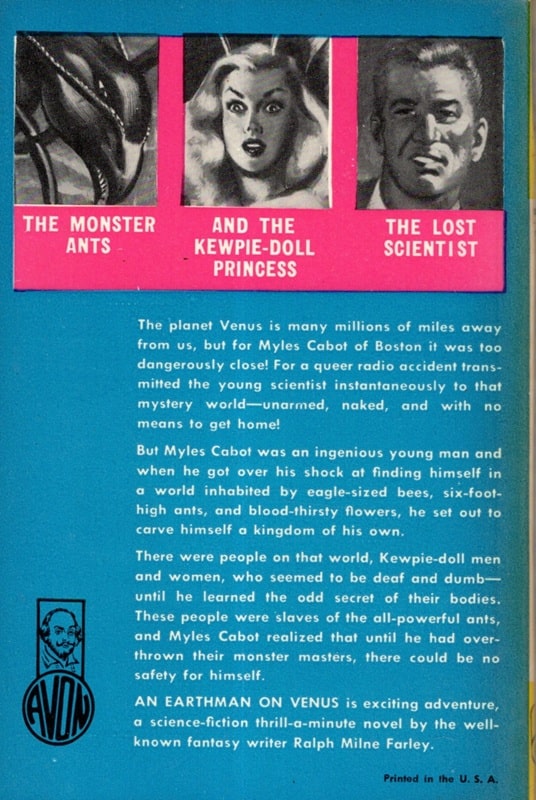
An Earthman on Venus (Avon, 1950). Cover by Raymond Johnson
Ralph Milne Farley (1887 – 1963) was a pseudonym for Roger Sherman Hoar. Hoar was a Massachusetts senator and an attorney general, so I can understand his use of a pseudonym to write his SF stories under, but I can’t imagine why he’d choose one just as long and awkward as his real name, and even less memorable.
At any rate, Farley was friends with Edgar Rice Burroughs and wrote his own series of Sword & Planet adventures sometimes called the Radio series, since most of the books featured the term radio in their titles.
[Click the images for non antmen-sized versions.]
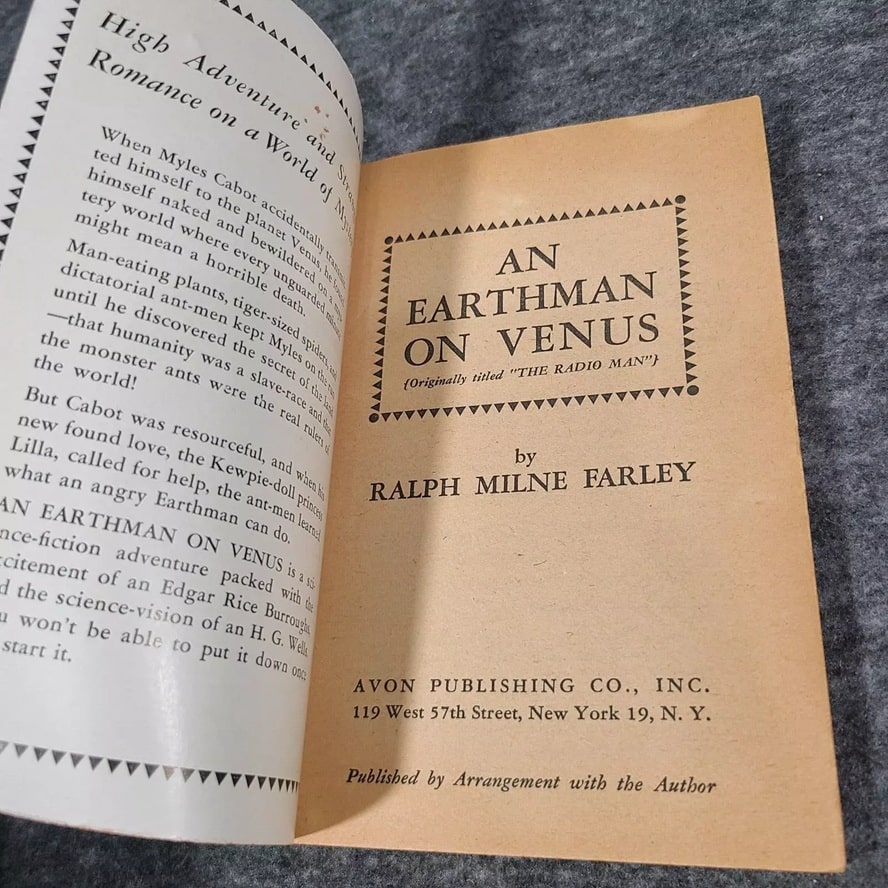 Inside cover of An Earthman on Venus
Inside cover of An Earthman on Venus
As far as I can see, there are about ten titles in this series, but I’ve only read the first two (covers shown above and below):
The Radio Man (or An Earthman on Venus): Avon Books, (Raymond Johnson cover), 1924/1950
The Radio Beasts: Ace Books, (Ed Emshwiller cover), 1925/1964
In The Radio Man, an Earth scientist named Myles Cabot invents a transmission device that uses radio and accidentally transmits himself to Venus, where he finds human-like beings — including a princess — who are enslaved by intelligent, horse-sized ants who use radio waves for communication. Cabot uses his technical know how to create guns for the humans and leads a revolt.
The story was inventive and fun but without nearly as much action and derring-do as ERB’s John Carter stories.
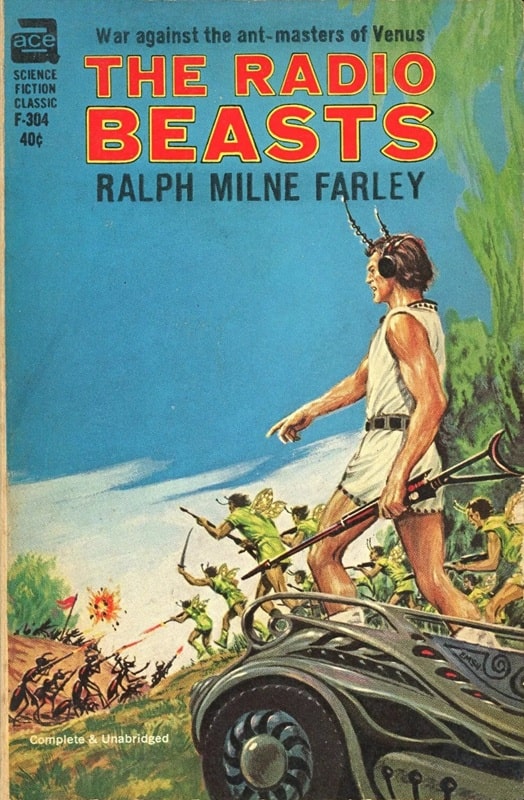
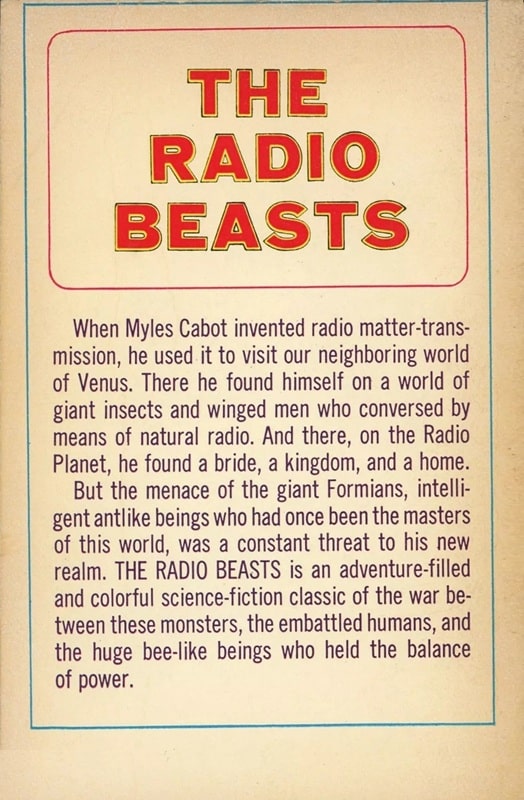
The Radio Beasts (Ace Books, February 7, 1964). Cover by Ed Emshwiller
The sequel, The Radio Beasts, was also readable but didn’t seem to add much to the overall story, and the writing doesn’t have the flair and color of ERB.
I don’t, at present, have any intention of reading the rest of the volumes, which — as far as I’m aware — consist of:
The Radio Planet
The Radio Flyers
The Radio Gun-Runners
The Golden Planet
The Radio Menace
The Radio Man Returns
The Radio Minds of Mars
The Radio War
Charles Gramlich administers The Swords & Planet League group on Facebook, where this post first appeared. His last article for Black Gate was Of Men, Monsters, and Little People.
Spotlight on “Fish Tales” by Nettie Jones
Fish Tales, by Nettie Jones, is a lost classic taking its rightful place in the…
The post Spotlight on “Fish Tales” by Nettie Jones appeared first on LitStack.
On McPig's Wishlist - The Warbler
 The Warblerby Sarah Beth Durst
The Warblerby Sarah Beth DurstFrom the author of The Lies Among Us comes a magical tale about mothers and daughters, choices and consequences, and the real meaning of home when every place feels like a cage.
Ten months. That’s the longest Elisa has stayed anyplace, constantly propelled by her fear that if she puts down roots, a family curse will turn her into a tree.
But she’s grown tired of flitting from town to town and in and out of relationships. When she discovers a small town in Massachusetts where mysterious forces make it impossible for the residents to leave, she hopes she can change her fate.
As Elisa learns about the town’s history, she understands more about the women in her family, who seem doomed to never get what they want. Now she believes she’s stuck, too—is that a patch of bark on her arm? But her neighbor’s collection of pet birds sings secrets that Elisa can almost understand—secrets she must unravel in order to be truly alive.
Book Review: White Line Fever by K.C. Jones
I received a review copy from the publisher. This does not affect the contents of my review and all opinions are my own.
 White Line Fever by K.C. Jones
White Line Fever by K.C. Jones
Mogsy’s Rating: 3.5 of 5 stars
Genre: Horror
Series: Stand Alone
Publisher: Nightfire (March 18, 2025)
Length: 368 pages
Author Information: Website
When it comes to horror stories, a girls’ weekend road trip meets a haunted highway sounds like it would be a match made in heaven. This is essentially the premise of K.C. Jones’ White Line Fever, which made me very excited to read it. But while the book is brimming with terrifying potential and starts off on the right track, it struggles to maintain that momentum, and by the end, I found myself more frustrated than thrilled.
The book follows Livia and her lifelong friends Ash, Mo, and Becka, who have affectionately called themselves “The Scoundrels” ever since their childhood days of adventure and mischief. As the story begins, Livia is passing another normal day doing laundry when she makes a devastating discovery while emptying her husband’s pants pockets—an unfamiliar condom wrapper, torn open. The shocking revelation of his infidelity immediately plunges Livia into a dark place. After growing up in an abusive home and eventually escaping her cruel and violent father, she’d thought she finally found happiness. Alas, it was not to be. Needing to get away, Livia turns to her old trio of friends, who suggest taking a road trip into the Oregon wilderness where they can all benefit from some quiet time away from life’s ugly realities.
However, their trip takes a dark turn when an unsettling encounter with an aggressive driver in a pickup truck forces them to take a shortcut through the backroads, onto County Road 951—known to locals as The Devil’s Driveway. Short as it may be, countless tragedies have occurred on this road, spawning dozens of urban legends about it and earning it its sinister nickname. Initially unfazed, the group is just glad to be back on schedule, but after a while, strange things start happening that make them question their sanity. All of them experience losing time and begin having nightmarish visions, and after driving for what seems like hours, they never seem to make progress off this lonely stretch of blacktop that’s only supposedly 15 miles long. Desperation and panic set in as they eventually realize they are trapped with no way to escape.
As this surreal ride unfolds, the novel shifts between past and present, allowing readers a glimpse into the characters’ traumatic pasts that have shaped each of them. Especially prominent are flashbacks to Livia’s childhood, which was spent in the small, insular town of Newberry. There, she and her mother lived in constant fear under the brutal authority of her father, who ran an auto shop and fixed up junk cars. For relief, Livia often sought the company of her friends, including sisters Ash and Mo, and hung out secretly in the junkyard. At some point, though, all of them have come up against the threat of Livia’s father, whose shadow looms over them even after all these years.
At first, this back and forth proved generally effective at creating an unsettling atmosphere and establishes reasons for Livia’s breakdown following the implosion of her marriage. The flashbacks were also welcome breaks in the present timeline in which the intro mainly featured the women driving and talking. However, this pattern quickly became repetitive, resulting in a long, drawn-out buildup period that ruined the eventual payoff. For one, the plot repeatedly teases the horror elements, then pulls back just as they start getting interesting. For another, the characters gradually reveal themselves to be frustratingly dense, doing more bickering than solving problems even as their situation went downhill. Simply put, after a while I just got tired of being jerked around and spending time with these moronic ladies.
Don’t get me wrong. Annoying characters and wonky pacing aside, the book is still pretty solid. But I do think the best parts came too late, especially towards the end when the group meets up with another character whose part in the story was actually introduced in the prologue. Still, while this connection brought the cohesion which had been lacking back to the book, it wasn’t enough to redeem all its earlier missteps. In fact, here the story veered into even weirder, more confusing territory, making for an interesting but somewhat disjointed conclusion.
In the end, White Line Fever is a flawed horror novel which excels in certain areas but falls short in others. But although the thrills didn’t live up to the premise, it is still worth checking out if you enjoy unsettling character-driven stories, and the concept of an all-female cast trapped in a supernatural horror predicament makes me think this would appeal to fans of Rachel Harrison.
![]()
![]()
New Audio Books
So, Amazon is offering me to Beta test AI generated Audio Books. (Virtual Voice Narration) To be clear, this is a Beta test, and I don't do audio. I've flirted with it a few times but I never got into it. My 1 time listening to it for myself was in the 90's when I found Anne McCaffrey had produced a tape of Dragonsong. That was... different.
Anyway, I have converted 5 books so far. They are available on Amazon and Audible.
If there is sufficient interest I will convert more. Not all books can be converted. (word count is limited to under 240k so big books are a no)... I'm curious as to how they work out. Obviously there will be issues (possibly funny ones) with pronunciations and such.
At the moment they are using an American female voice. I don't know how to do alternate voices. (it was mentioned that they may extend it to have different voices do different characters at some point) I was tempted to try the British female voice but held off. I'm not sure if you the listener can play with the voice on your own.
Enjoy!
Upcoming Books
Sitrep:
I have finished 4 books and they are with the Proofreaders:
Jethro 9 Siege

To be published April 2025
Multiverse 8

To be published June 2025
Shelby 9 Peacekeepers

To be published August 2025
Tales of the Federation Reborn 7 Winds of Change
 To be published in October 2025
To be published in October 2025
The Story of Orc Dog

Before I tell you this story, I will say that everything ends happily.
Sookie is our elderly Ye Olde English Bulldogge, otherwise knows as the orc dog. She is beauty, she is grace, how can you not love that face?

She is going on 13 years old. Her hips and her knees have arthritis. She moves around solely because of the steady regimen of fivovet, gabapentin, and osti, a joint supplement, which Gordon administers to her every morning via a hot dog. We started her on smoked sausage at first, because Sookie, despite eating rocks and random crap, is a master of spitting the pills out. Hiding them first in her favorite sausage and then in hot dogs is the only way we can get her to take it without shoving a hand down her throat. The morning pill ritual became known as sausage time. Occasionally Sookie will drag herself into the kitchen and sit because it’s sausage time and she would like her treat, please.

Several days ago, I woke up at 4:30 am and couldn’t go back to sleep. After rolling around for a while, I checked my phone and it was a good thing I did, because Kid 2’s house had sprung a leak and she was in a panic. That’s a fun story for another time, but to summarize, it turned out that a 2×4 fell because of a faulty nail and dented her AC pan. It ended happily, but threw me into a sleep deficit for a few days.
A couple of days later, I wake up in the middle of the night again. I check the clock. 4:30 am. What is it about the 4:30? I hear a choking sound, which, as any dog owner will tell you, is code for get up and let your dog outside. I open the primary bedroom’s door, let Sookie out, and flick on the lights, resigning myself to cleaning up some dog vomit.
Blood. It’s like a crime scene from a gory police procedural. There is blood on the floor, blood on her pillow, blood, blood, everywhere is blood.
OMG, our old dog is dying.
The other two dogs are like, “Hey, there is blood. How cool.”
I check on Sookie. She is standing in the yard in the dark. I grab peroxide, drown the worst of the blood on the floor – yay, tile, mop it up with paper towels, so no cats or dogs decide to taste it. Then I wake up Gordon, tell him there is blood, and then we both go to get Sookie in.
Sookie walks very slowly because of her arthritis, so it takes awhile. Finally we bring her in and she takes two steps inside the house and collapses. Her paws are bloody, her chin is bloody, everywhere is bloody. I’m sitting on the floor, with peroxide and paper, my hands in latex gloves, and frantically trying to clean her up to see if it’s a wound of some kind.
There is no wound. The blood is coming from her mouth. It must be internal bleeding.
By now it’s past 5:00 am. The only emergency vet in range is on the other side of New Braunfels. It will take almost an hour to get there, and when we do get there, we will have a long wait. She is 80 lbs of dead weight and Gordon, who normally would pick her up and carry her, can’t do it because of his shoulder.
I’m crying because the dog is dying. Cleaning and crying and cleaning and…
Sookie sighs, gets up, and goes to the kitchen to drink water.
We watch her drink and then she sits by the island.
Sookie: Sausage time?
Us: WTF.
Gordon gets a chunk of chicken and tosses it to her. She snaps it out of the air and eats it.
Clearly the news of her demise was greatly exaggerated.
We decide to wait for our regular vet to open. There is no point in going to the New Braunfels vet, because not only will it take forever to get down there with traffic, but she took food and water which means she will be triaged to the middle of the line, so dogs hit by cars and bitten by rattlesnakes can get life-saving care.
Our vet opens at 7:00 am, I call them, they get us in first thing in the morning.
Sookie has infected teeth. There must’ve been an abscess. It ruptured. How did a cup and a half of blood come out of it, I have no idea, but that was the answer.
Sookie was scheduled for the dental surgery. This was very stressful all around. We weren’t sure if she would come through the surgery okay because of her age, but her quality of life was a factor and unchecked tooth decay can lead to gum disease and jaw infections. Cue a week of tense waiting.
She had the surgery yesterday. 13 extractions and almost $3,000 later, here she is back to living her best life on her pillow.

She is very mad at us. She occasionally groans, and right now she is not in the study with us because she chose to lay in the living room by her lonesome. However, she took soft food and water today so we are on the road to recovery.
In other good news, the final edit of This Kingdom was accepted and we are off to the copyedit. Much rejoicing all around.
Here is hoping for a few days of not waking up at 4:30 am because of some crisis.
The post The Story of Orc Dog first appeared on ILONA ANDREWS.
The Beating Heart of Science Fiction: Poul Anderson and Tau Zero
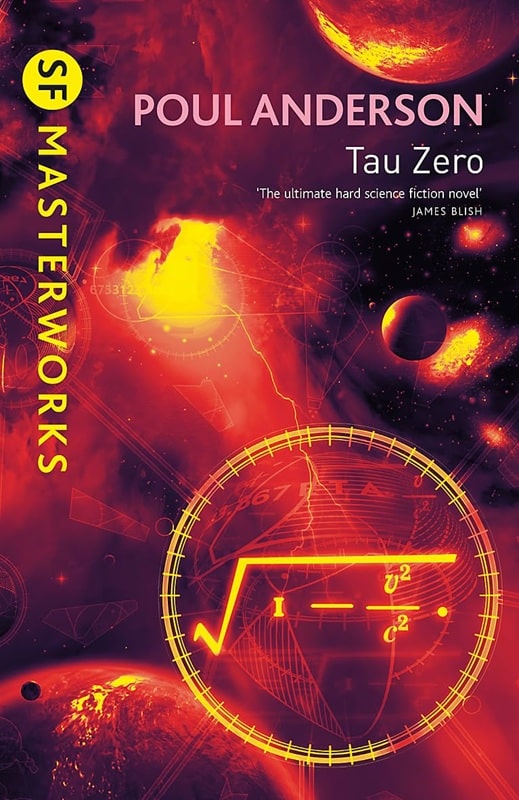 Tau Zero (Millennium/Gollancz SF Masterworks, February 2006). Cover by Dominic Harman
Tau Zero (Millennium/Gollancz SF Masterworks, February 2006). Cover by Dominic Harman
Science fiction — what is it, really? What elements place a story firmly in the genre? For any requirement that you can think of, there is probably a great sf story that violates it, and rather than cobble together some dictionary-ready definition, it’s easier to just think of particular books that you would hand to someone unacquainted with the genre with the words, “Here — read this; this is science fiction!”
Everyone would have their own choices for such a list, of course, and those choices would amount to your de facto definition. For me, some of those books would be Rendezvous with Rama by Arthur C. Clarke, The Stars My Destination by Alfred Bester, and Man Plus by Frederik Pohl, but the very first book on my list would be Poul Anderson’s 1970 novel Tau Zero. Why? What does this book have that makes it a quintessential work of science fiction?
Maybe it’s this — it’s a grand voyage, a brave excursion into the great out there, and it also has a grand perspective shift, like a camera pulling back in a movie, a maneuver that radically alters everything that you had previously thought about the story, something that’s not a minor adjustment, but a move that completely explodes the frame. You think the story is this, but it’s really that, you think you’re here, but you’re really there; the here where you thought you were turns out to be the tiniest corner of there, a there that is larger and stranger and more dizzying than you ever could have originally imagined. (In The Encyclopedia of Science Fiction, Peter Nicholls calls this kind of maneuver a “conceptual breakthrough.”)
Tau Zero begins as a straightforward story of an interstellar voyage, but it ends as far away from that prosaic beginning (prosaic by the standards of science fiction, I mean) as it is possible to imagine. Farther than that, really, and I think that’s the whole point.
Sometime in the 23rd century, the colonization ship Leonora Christine sets out from earth for a planet thirty light-years away. Unlike many stories of this type, the voyage isn’t prompted by the world coming apart at the seams; generally, things are going quite well, which is largely due to the people of the planet submitting to a global government run exclusively by… Scandinavians. Everyone just handed the reigns to the Nordic folk because of their universally acknowledged rationality, efficiency, impartiality, and lack of any pesky Will to Power. I know, I know — send any complaints to that son of Denmark, Poul Anderson. I guess he figured he would inoculate his readers against all the wildness to come by giving them the nuttiest thing first.
If the interstellar colonization mission is a stock situation, Anderson peoples it with characters that are themselves mostly recognizable types. The Leonora Christine’s Captain is Lars Telander, a solid, stolid, stoic father figure who seems ideal at the beginning of the journey, but who fades (if not wilts) into the background under the stresses of the voyage and the extraordinary emergency that the crew eventually has to deal with. More central to the life of the ship and the story Anderson tells are First Officer Ingrid Lindgren, ultra-competent while still being sensitive and sympathetic, and the book’s real protagonist, Ship’s Constable Charles Reymont, willing to be as much of an unlikable, hard-nosed SOB as necessary in order to hold the crew together and complete the mission. Reymont’s and Lindgren’s on-again, off-again romance and their consciously embraced good cop/bad cop roles form the human core of the story.
Anderson devotes significant time to this pair and to the other crew members whom they alternately coax (Lindgren) and steamroll (Reymont) on the way to their goal. In one sense, the book is a tract on the dynamics of leadership in a uniquely stressful situation, and the author had clearly thought a lot about such problems and had some definite ideas about how to deal with them.
It has to be said, however, that Anderson’s depiction of character rarely rises above a fairly rudimentary level; there’s an off-the-rack feel to most of his people. What we have here isn’t Henry James in space, and stylistically, the book wasn’t written to dazzle; if you’re looking for graceful allusiveness, poetic imagery or memorable turns of phrase, you need to look elsewhere; Anderson’s prose generally doesn’t rise above the level of “workmanlike” (which doesn’t mean that it’s bad — it usually has the far from negligible virtues of efficiency and clarity). So, old Poul is no Nabokov in space, either.
So what? Tab A in Slot B prose and slide-rule stiff characters are hard-sf traditions that go back all the way to the vacuum-busting days of Hugo Gernsback (and Anderson’s work isn’t nearly as wooden as the stuff old Hugo published), which just means that you adjust your expectations when you read this kind of sf story. (Oh, what’s a slide rule? Google it, kid.)
In the long run, Anderson’s deficiencies are perfectly acceptable because what you read Tau Zero for is the writer’s wide-screen vision and the extraordinary crisis his people face, and what a vision! What a crisis!
The Leonora Christine powers itself by collecting hydrogen as it travels through interstellar space and using it for fusion. (Technically this makes the ship a Bussard ramjet, though Anderson never uses the term.) As such a ship can approach the speed of light but cannot exceed it, the vessel’s flight plan is to accelerate up to near light speed during the first half of its voyage and then steadily decelerate down from that halfway point until it arrives at the target planet. Because of the relativistic time dilation caused by its extreme speeds, over thirty years will pass on earth while only five years will pass on board the ship.
Initially, things go smoothly as the crew settles into the routines that will occupy them during their long journey, and as expected, people (half of the multinational, fifty-person crew are male and half are female) begin to pair off in preparation for life as colonists on their new world. Everything seems to be going according to plan, until, before reaching the midway deceleration point, the Leonora Christine collides with an unanticipated interstellar dust cloud; because of the ship’s increased mass (due to its speed) this is potentially a very serious event, more like slamming into a brick wall than strolling through a fog bank.
At first, the ship seems to come through this emergency surprisingly well, but the truth soon becomes apparent. The collision has caused irreparable damage to one vital system — the one used for deceleration. The Leonora Christine is unable to slow down.
Why is the damage irreparable? To make repairs, it would be necessary to exit the ship, but the engines generate radiation that would be instantly fatal to anyone outside the hull, and the engines cannot be shut down because they generate an electromagnetic field which is the only thing protecting the crew from the hard radiation of galactic space. (The darn thing must not have been designed by Scandinavians.)
Reymont, Lindgren and the rest are thus faced with the prospect of an endless, pointless voyage that can only conclude with their own deaths from accident, old age or despair, sealed inside something that began as a ship, turned into a prison, and can only end as a coffin. Such an appalling situation would be bad enough, but the Leonora Christine’s crew soon comes to an even grimmer realization.
Unable to decelerate, the time dilation that was to have initially separated them from their home by a mere thirty years is only growing more extreme. The stunned crew members quickly realize that it is not decades that are passing outside the ship, not centuries, not millennia, even. “Soon”, millions, and then billions of years have passed. The would-be colonists whose aim was to open a new world for people from earth to live on must now accept that earth’s sun has long since burned to a cinder, their planet has vanished, their species has become extinct. The fifty exiles on the Leonora Christine are the last human beings alive in the universe, and unless they can find a solution to their dilemma, they are the last human beings that there will ever be.
How will they respond? Panic? Madness? Suicide? Reymont and Lindgren (especially Reymont) are resolved to hold the crew together, determined that they will all continue to do their jobs in the hope (hope being one of the defining characteristics of the late, great human race) that they will eventually find some way to slow down and locate some world, somewhere, where they can make a new start and keep their species alive.
Despite being more radically alone than any human beings have ever been (at one point, someone quotes Father Mapple from Moby Dick — “for what is man that he should live out the life-time of his God?”), for the most part, the Leonora Christine’s people respond well; the extreme strain sometimes produces extreme effects, but no one commits suicide. (I suspect that Anderson knew that in such a situation, if just one person took that way out, it would likely be the effective end of everyone.)
Soon they have left, not only our own galaxy, but also the supercluster of galaxies that constitute our local “neighborhood”, in the hope of reaching a region in which radiation levels will be low enough to permit them to make their repairs. As these “empty” gulfs are completely uncharted, they are also trusting that chance (or that God whom some of them still believe that they have not outlived) will eventually bring them to a galactic group where they will find a suitable planet.
Unexpected difficulties continue to intervene, however, and by the time they are able to fix the damage and decelerate to begin their search for a new home, there is no longer any potential home to decelerate to; so much time has passed outside the ship that the expansion of the universe caused by the original Big Bang has reversed. The universe is now contracting in a “Big Crunch” in which all matter and energy are forced closer and closer together until the cosmic cycle will restart with another Big Bang.
What is there for the Leonora Christine to do but circle the cosmic seed and attempt to ride out the coming explosion and then try to find a young world to begin again on? That’s just what they are able to do, and the story that began on an old planet in an old galaxy in an old universe ends on a new planet in a new galaxy in a universe that didn’t even exist when the story began, uncounted trillions of years before.
The book closes with Charles Reymont and Ingrid Lindgren, two people who now constitute one twenty-fifth of the entire human race, standing on the soil of the home they have travelled such an inconceivable distance in time and space to reach. “Here was not New Earth”, Anderson says. “That would have been too much to expect.” But it is a place where the stubborn, resourceful, endlessly hopeful human race will be able to start anew, a place where it will have a chance to take root and flourish… and perhaps, avoid some of the mistakes that plagued it long ago in a universe that now no longer exists.
Charles Reymont, the man whose determination saved the entire human race, lightly rejects the suggestion of kingship that Ingrid Lindgren jokingly (but also not entirely unseriously) makes, and then “he laughed, and made her laugh with him, and they were merely human.”
Pardon my French (a language once spoken on the long-extinct planet earth), but… holy shit!
Tau Zero was called by James Blish the “ultimate hard science fiction novel.” It’s certainly difficult to think of one that could go beyond it; every time I finish reading it, I want take my brain out, shake it a little, massage it, and run it under a cold faucet before putting it back in my skull. It’s a book that takes your perspective and stretches it, and stretches it, and keeps on stretching it until you walk around bumping into walls because you’re so far from where you started that you have no idea where you are anymore and can’t even begin to imagine where you’re going to end up when you’re finished.
Even in the science fiction genre, there aren’t many books like that. Even a lemon-sucking, hard line anti-Campbellian anti-sentimentalist like Barry Malzberg grew positively misty whenever he talked about the book. Calling the novel “magnificent”, Malzberg rhapsodized that Tau Zero was “the only work published after 1955 that can elicit from me some of the same responses I had towards science fiction in my adolescence — a sense of timelessness, human eternity, and the order of the cosmos as reflected in the individual fate of every person who would try to measure himself against these qualities.”
This wasn’t just Malzberg indulging in nostalgia; Poul Anderson’s book, which marries a modest nuts-and-bolts style with a beyond-audacious premise, really does what Malzberg says it does, and in doing so it goes beyond the merely mind-boggling; it squares the boggle and keeps on squaring it until you’re so dizzy with infinitely expanding possibility that you have to lie flat on the floor for a while. For me, it’s the wildest, most exhilarating trip in all of science fiction.
I’m not going to return to the definitional task that I disavowed when I began this piece, but I do know that one of the things that we most want from a science fiction story is that when we finish it, we won’t end up back where we started. We want it to take us on a voyage, the kind of voyage that no other kind of writing can accomplish or even attempt.
If you want to know what kind of voyage that might be, I can do no better than to turn you over to one of the genre’s greatest voyagers, Poul Anderson, and commend to you his indeed magnificent novel, Tau Zero. When you’ve finished reading it, you might just feel — along with me — that what you’ve been holding in your hands is nothing less than the beating heart of science fiction.
Thomas Parker is a native Southern Californian and a lifelong science fiction, fantasy, and mystery fan. When not corrupting the next generation as a fourth grade teacher, he collects Roger Corman movies, Silver Age comic books, Ace doubles, and despairing looks from his wife. His last article for us was The Gorey Century
7 Author Shoutouts | Authors We Love To Recommend
Here are 7 Author Shoutouts for this week. Find your favorite author or discover an…
The post 7 Author Shoutouts | Authors We Love To Recommend appeared first on LitStack.
Bet On Me, Daddy - Book Review by Voodoo Bride
What is it about:Years ago, I made a promise to myself. That I would never again put myself at the mercy of a man.
Especially a man as sinfully rich and gorgeous as Beckett Stone.
Until the day a stupid little bet put me exactly where I swore I’d never be again. On my knees, ready to surrender it all for two little words.
Good girl.
I keep telling myself it’s casual. Just a club fling I can walk away from whenever I want.
And I should. Walk away, that is.
Because I’m not the only one with a shattered past. The ghosts that haunt Beckett’s dark, brooding eyes tug at my heartstrings. They make me want to forget all the promises I’ve made for myself. To throw caution to the wind and beg him to take a chance on me. On us.
To beg him to Bet on Me, Daddy.
What did Voodoo Bride think of it:Although we mainly read Fantasy or SciFi, once in a while a Contemporary book catches my eye. I saw the author mention this book on social media, I went to investigate, saw that beard: had to get it!
And this is a delicious read.
I should warn the casual BDSM reader that this Romance has a Daddy/Brat relationship, be aware it's not just a little spanking when in the bedroom, but an all in lifestyle.
That out of the way: I loved the dynamics between Ruby and Beckett. They both feel a strong attraction toward each other, but both have their reasons to not want to commit to a relationship. As they decide to be 'casual' they soon are in over their heads though.
The viewpoint switches between the two so you get to see in both of their heads. I could easily understand them both, and rooted for them to open up and let the other inside. Add some seriously hot scenes and I could not put this book down.
You bet I'll be be getting my hands on the first book, and there's going to be a book/series about a side character who immediately drew my attention!
Why should you read it:It's a deliciously hot BDSM Romance
Snake Oil Bullet by Craig Schaefer (reviewed by Mihir Wanchoo)

Official Author Website
Order Snake Oil Bullet over HERE
Read Fantasy Book Critic's review of The Long Way Down
Read Fantasy Book Critic's review of The White Gold Score
Read Fantasy Book Critic's review of Redemption Song
Read Fantasy Book Critic's review of The Living End
Read Fantasy Book Critic's review of A Plain-Dealing Villain
Read Fantasy Book Critic's review of The Killing Floor Blues
Read Fantasy Book Critic's review of The Castle Doctrine
Read Fantasy Book Critic's review of Double Or Nothing
Read Fantasy Book Critic's review of The Neon Boneyard
Read Fantasy Book Critic's review of The Locust Job
Read Fantasy Book Critic’s review of Down Among the Dead Men
Read Fantasy Book Critic’s review of Dig Two Graves Read Fantasy Book Critic's review of Sworn To The Night
Read Fantasy Book Critic's review of Detonation Boulevard
Read Fantasy Book Critic's review of Winter's Reach
Read Fantasy Book Critic's review of The Instruments Of Control
Read Fantasy Book Critic's review of Harmony Black
Read Fantasy Book Critic's review of Red Knight Falling
Read Fantasy Book Critic's review of Glass Predator
Read Fantasy Book Critic's review of Cold Spectrum
Read Fantasy Book Critic's review of Right To The Kill
Read Fantasy Book Critic's review of Black Tie Required
Read Fantasy Book Critic’s review of Never Send Roses
Read Fantasy Book Critic's review of Ghosts Of Gotham
Read Fantasy Book Critic' review of A Time For Witches
Read Fantasy Book Critic's review of The Loot
Read Fantasy Book Critic's review of The Insider
Read Fantasy Book Critic’s review of Any Minor World
Read Fantasy Book Critic's Interview with Craig Schaefer
Read Fantasy Book Critic's Harmony Black Series Interview with Craig Schaefer
Read Double Or Nothing Cover Reveal Mini-Interview with Craig Schaefer
Read Part I of Fantasy Book Critic's In-depth Interview with Craig Schaefer
Read Part II of Fantasy Book Critic's In-depth Interview with Craig Schaefer
Read the Wisdom's Grave Trilogy Completion Interview with Craig Schaefer
Read the 2019 And Beyond Interview with Craig Schaefer
Read the Right To The Kill Cover Reveal Q&A with Craig Schaefer
Read the Black Tie Required Cover Reveal Q&A with Craig Schaefer
Read the Charlie McCabe series interview with Craig Schaefer
Read My Sworn To The Night Cover Reveal Q&A with Craig Schaefer
Read 2020 State Of Schaefer Interview with Craig Schaefer Read Celebrating A Decade Of Dark Fantastical Tales with Craig Schaefer
OVERVIEW/ANALYSIS: The Joker had quoted something intriguing in the Dark Knight “I believe that whatever doesn't kill you, simply makes you... stranger”. I don’t know if Heather Schaefer took this as a motto for Harmony Black to live by but it certainly seems to be a guiding statement for this series. Within the past three books Harmony, Jessie and team have had their backs against the wall, Harmony especially has had a horrid time with her powers being erratic as well.
Snake Oil Bullet deals with a lot of plot threads and characters from the past seven books. There’s not a lot I can say about the main plot without spoiling it but the least I can say that a certain doctor from book 7 makes his reappearance as well as other heinous villains from the team’s past. All in all this volume has a lot going on within. This is also a book which acts as a bookend to the second arc of the Harmony Black series while also setting up a tantalizing future.
I was thinking there would be a Hannibal Lecter-Clarice Starling going with Harmony and her tormentor-in-chief demon but the author neatly sidestepped this scenario and sets up something else. There’s also a lot of things that are revealed about Harmony’s past which set up future intrigue. The author has definitely settled the question of who the Paladin is but Harmony will have a huge part to play based on what is revealed about her heritage. This book has some interesting action sequences and the best part is the author’s usage of mirror opposites during the climax (you’ll know what I mean when you read the book).
The Vigilant Lock team has come a long way from where it started and with the end of the second arc. The author has shaken up the board and now things are moving slowly but surely towards the big Enemy-Paladin conflict that has been teased over both the Faust and Black series. Rest assured there will be plenty of alien & extra-dimensional trouble heading the team’s way and we the readers will be here to enjoy it. I also loved how incredibly intricate this series is with the First Story saga and yet has its own weird ongoings as well. The ending promises more carnage of both the personal and team kind but Jessie and Harmony are no pushovers either.
Snake Oil Bullet is a fun and twisted story that uses all the pillars which have been set up in the past and creates a dark canopy for readers to enjoy. The plot is streamlined, packed with action, and twisted reveals. As a fan this book helped satiate my Harmony Black cravings while giving me more to ponder. I can’t wait for more of Harmony and whichever title Heather releases next.
In the History of Vintage Science Fiction & Fantasy, Nothing Compares to Gnome Press
Isaac Asimov’s I, Robot and the Foundation Trilogy. Robert A. Heinlein’s Sixth Column. Arthur C. Clarke’s first three novels. The entire Conan saga from Robert E. Howard. The International Fantasy Award winner City by Clifford D. Simak. The Hugo Best Novel winner They’d Rather Be Right from Mack Clifton and Frank Riley. Books by L. Sprague de Camp and Fletcher Pratt, A. E. van Vogt, C. L. Moore and Henry Kuttner, Murray Leinster, Frederik Pohl, Jack Williamson, Andre Norton, and James Gunn.
Those would be a solid core of any collection of vintage f&sf. Yet those books and dozens of others appeared in a few years from just one small publisher: Gnome Press.
Fantasy had long been a staple of what we would now call mainstream publishing but before the 1940s American science fiction was relegated to gaudy pulp magazines, critically reviled as among the lowest forms of fiction. The superweapons that emerged from World War II, especially the atomic bomb, suddenly made the field look prescient, a look into the onrushing future.
 Windsor [ON] Star, November 2, 1946With mainstream publishers still reluctant to mine magazine back issues, fans of the genre saw a publishing niche. More than a dozen small presses sprang into mayfly-like existence before 1950.
Windsor [ON] Star, November 2, 1946With mainstream publishers still reluctant to mine magazine back issues, fans of the genre saw a publishing niche. More than a dozen small presses sprang into mayfly-like existence before 1950.
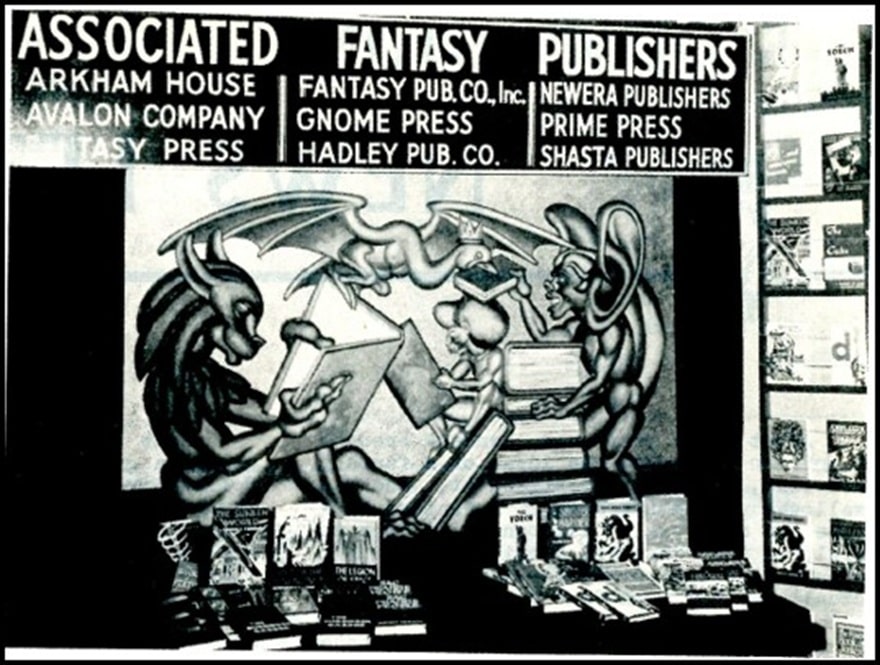 Bloomington News Letter fanzine, February 1949
Bloomington News Letter fanzine, February 1949
Gnome was founded in 1948 by two members of New York fandom, Martin Greenberg and David A. Kyle.
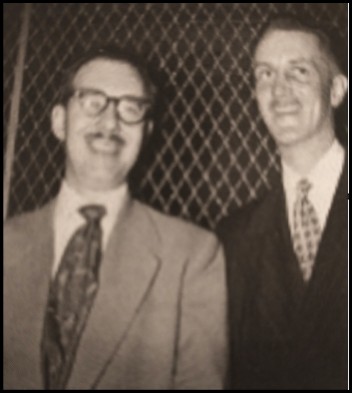 The only known photo of Greenberg and Kyle together
The only known photo of Greenberg and Kyle together
Run on the proverbial shoestring, Gnome nevertheless outpublished, outsold, and outlasted all their competitors. Greenberg had a knack for making deals and Kyle did everything else, including drawing a half-dozen covers. He was soon obsoleted by young – and cheap – newcomers like Edd Cartier, Ed Emshwiller, and Frank Kelly Freas.
The firm made mistakes – could there be a worse response to the dawn of the Atomic Age than to drop three fantasies as its first three selections? – but quickly caught on to what the public wanted. Greenberg was a disciple of John W. Campbell who, whatever is thought of him today, then towered over the field as the guru editor of Astounding Science Fiction and Unknown Fantasy Fiction magazines. Whatever he touched, sold.
Greenberg used the magazines as his Comstock Lode and cannily offered to republish story series as “novels,” suiting post-war tastes if not the labeling laws. Authors flocked to Gnome’s door, desperately wanting hardback publication.
Well, that and money. Greenberg gave them only the former. He and Kyle split the proceeds fairly. Greenberg got a salary and Kyle didn’t. (Kyle always had multiple jobs and Greenberg had a family. But still.) Nevertheless, Kyle stayed six years and Gnome lasted fourteen, with Greenberg owing money to everyone in sight. He is usually described as a charming rogue with a gift of gab. Asimov once went to him demanding money and wound up lending more.
 Isaac Asimov royalty payments, auction catalog
Isaac Asimov royalty payments, auction catalog
History is never pretty. Flaws and all, nothing compares to Gnome in the history of vintage f&sf. In many ways, it is the history of vintage f&sf.
I knew nothing about Gnome when I chanced upon several titles in a used bookstore in 1980. I had seen the name in passing, but histories of the small presses were nonexistent. I found a list of all 86 titles, and dove in. A few decades later I had them all. Did I stop there? What fun would that be? Gnome produced about 75 variants, with different boards or different jackets. Nobody knows exactly how many, because new ones keep popping up. Finding all of them is essentially impossible, which means the search never has to end – the perfect collectible.
Moreover, Gnome published a variety of ephemera, from newsletters to catalogs to calendars and I set out to accumulate all that appeared on the market. I even bought the 1951 Fantasy Calendar, which was an unparalleled achievement since it doesn’t exist. (Blame Donald Wollheim.)
Digging for information is infinitely easier today than in 1980, yet Gnome appears to have left virtually no paper trail, an oddity for a publisher dealing every day with paper. Other than a few scraps at Syracuse University, no business records seem to have survived and not even the indefatigable Kyle bothered to talk much about his time at Gnome in the millions of words he wrote for fanzines.
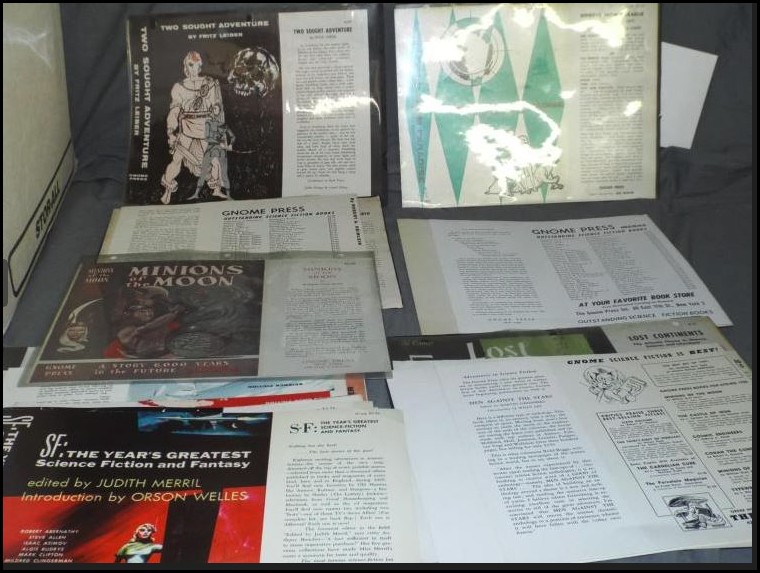 Gnome cover proofs, auction catalog
Gnome cover proofs, auction catalog
Nevertheless, dogged digging over decades created a repository of everything known about Gnome. Near archaeological level scrutiny of covers, flaps, copyright pages, and back panels yielded a history of each title. Each answered question led to ten additional mysteries. Eventually I wrote an utterly unpublishable 660-page manuscript dump that would require more than a thousand images to elucidate the text.
What’s 150,000 words and 1100 images to the internet? I already owned the URL GnomePress.com. The 113 pages there now comprise the first complete bibliography of Gnome Press (by author, title, and publication date), a separate page for each title with color scans of every variant board and cover I own along with contemporary reviews and previously unknown photos of the more obscure authors, information about a range of associational items, and histories both of Gnome and the f&sf field up to the time of its founding.
For all its literally exhausting coverage, the site remains a work in progress. Gnome collectors continue to provide information that require revision to opinions I previously thought firm. If anyone reading this has even the slightest scrap they want to share, please contact me. Or just ask questions about Gnome. Anything, except how much a book is worth.
By the way, Marty Greenberg’s file copy of I, Robot inscribed to him by Asimov is listed on the internet at $50,000. If you’re the buyer, please contact me. I want to know all about you.
Steve Carper is the author of hundreds of articles on fascinating, if obscure and forgotten, tidbits of history, as well as the seminal book Robots In American Popular Culture. All of his websites are linked at SteveCarper.com.
Comment on End of Winter Update by Pam
The UK and US covers are very different, does that mean that the stories are different? With two different editors, is the difference mostly grammar? Or content? Or reference to modern life?
C2E2 Update!
Jim will sadly be unable to attend C2E2 this April as previously scheduled. He sends his best to the attendees and convention and looks forward to seeing fans at future upcoming events!

Teaser Tuesdays - Contagion
Rereading this for an online book club.

Ähhh." Cleaver said, but given the way his brow wrinkled, Lisbeth still wasn't certain he was following.
"There's nothing here," Sullivan growled.
(page 86, Contagion by Erin Bowman)
---------
Teaser Tuesdays is a weekly bookish meme, previously hosted by MizB of Should Be Reading. Anyone can play along! Just do the following: - Grab your current read - Open to a random page - Share two (2) “teaser” sentences from somewhere on that page BE CAREFUL NOT TO INCLUDE SPOILERS! (make sure that what you share doesn’t give too much away! You don’t want to ruin the book for others!) - Share the title & author, too, so that other TT participants can add the book to their TBR Lists if they like your teasers!
Galadon cover reveal and pre-order
Book review: Old Soul by Susan Barker
 Book links: Amazon, Goodreads
Book links: Amazon, GoodreadsABOUT THE AUTHOR: SUSAN BARKER is the author of four books. Her third novel, The Incarnations, was a New York Times Editors’ Choice and Notable Book, a Kirkus Reviews’ Top Ten Book of the Year and shortlisted for the Kirkus Prize for Fiction. An excerpt from her fourth novel, Old Soul, won a Northern Writers’ Award for Fiction in 2020. Susan currently lives in Manchester, where she is a Senior Lecturer in Creative Writing at Manchester Metropolitan University.
Publisher: G.P. Putnam's Sons (January 28, 2025) Length: 352 pages, Hardcover Formats: Audiobook, ebook, hardcover, paperback
Old Soul is darker, sharper, and far more sophisticated than typical horror. No cheap thrills here - just an unnerving sense of inevitability creeping in with every page. Readers willing to handle a slow burn, a literary structure, and nuanced characters will love it.
The novel opens with two grieving strangers - Jake and Mariko - meeting in an Osaka airport. They share drinks and talk just to discover they both lost someone they loved under similar, rather horrific, circumstances. Their loved ones died thousands of miles apart, but each had met the same enigmatic, dark-haired woman beforehand. Oh, and one more thing - their internal organs were reversed.
From there, Jake starts a globe-spanning journey. Obsessed with the case, he’s collecting testimonies from people who’ve lost someone to the woman. Each of them reads like a miniature horror story.
Meanwhile, the woman herself is out in the Badlands, luring her next victim and she needs to hurry up. Immortality isn’t as glamorous as folklore would have you believe, and rotting from the inside is no fun.
The alternating perspectives - Jake’s investigation and the glimpses into the woman’s present build a slow, creeping dread. To me, this narration feels elegant and eerie. The horror here is intelligent, and creeping, with moments of near-cosmic dread. Despite the book’s sophistication, it never feels pretentious. It’s gripping and visceral and never gets lost in its own literary ambitions.
A few words about the mysterious woman. She is, without question, evil. But not in a theatrical way - there’s no excess, no unnecessary cruelty. She does what is required to survive and moves across centuries and continents under countless names, always ready to trade lives for immortality. She abandoned family long ago. Human connection, belonging - these are irrelevant. All that matters is survival. This relentless, almost inhuman focus makes her alien, but also fascinating.
Some books sink their teeth into you slowly. Old Soul goes straight for the bone. This is literary horror in the best sense - dark, sophisticated, and unsettling in a way that lingers long after you turn the last page.
Free Fiction Monday: Familiar Territory
Buster’s final wish—a Viking funeral. Although Winston, a small magician with a small talent, wants to give his familiar his ideal funeral, Winston finds it hard to imagine how to burn a boat at sea. Still, a Viking funeral seems a small price to pay for years of companionship.
But the funeral might cost Winston more than he realizes. He must break all kinds of laws—magical and otherwise—to give his beloved cat the proper goodbye.
“Familiar Territory” is available for one week on this site. The ebook is also available on all retail stores, as well as here.
Familiar Territory A Winston and Ruby Story By Kristine Kathryn Rusch
Every morning they went clamming. Winston would carry the pail, and Buster would trail behind, stopping to sniff dead fish and complaining when his delicate paws sank in wet sand. Sometimes people would coo over him—they seemed drawn to a cat on the beach—but usually they would watch from a distance.
Winston knew the town thought him strange. They called him that crazy guy with the cat, and most never visited his shop. Only tourists came in, and they usually bought the mass-produced items, not his specialty items. Those he sold to select customers who never returned, although they recommended the store to their friends. He did a steady mail order business, shipping weekly all over the United States, Canada, and Europe.
He didn’t care about the money. It was merely a way to maintain his warm and cozy home, built on a cliff overlooking the sea. He had worn a path from the back door to the beach near the small town of Seavy Village, and he and Buster tramped down the path daily at first light, crabbing if the tides allowed, and playing in the sand until nine a.m. Then Winston returned home, showered, and drove to his shop on a decrepit section of Highway 101. Buster complained about the drive, but flirted with the customers shamelessly while Winston studied his books behind the counter.
It was a small life, as magic ones went, but it was his, his and Buster’s. They had shared it since Winston fled San Francisco twenty years before and arrived in Seavy Village to find the cliff house for sale, and a rain-soaked kitten who spoke perfect English huddled beside its front door.
Only this morning, Buster didn’t wake up. He remained curled at the foot of the bed, eyes half open, skin already cool. They had known the end was coming—few cats made it to twenty and remained as healthy as Buster—but they hadn’t thought it so soon. Kind of Buster to wait until Monday, the only day the shop was closed.
Winston put his hand on Buster’s still black-and-white side, and wished that instead of all his tiny powers, he had a single large one: the power over death.
But he didn’t, and he never would. He sighed once, cradled his best and only friend for a long time, and then padded into his workshop to build a ship.
***
Buster had requested a Viking funeral.
The cat, being 90% feline and only 10% familiar, didn’t care about state regulations regarding the ocean. He didn’t care that it was against the law to throw anything into the waves. He didn’t care that Oregon hated people tossing the ashes of loved ones onto the sea, and would probably charge Winston with a felony for tossing a dead body in.
You can cover it, boss, Buster had said. Use a small spell, a shield or something, to make sure nobody sees you.
I thought cats hate the water, Winston replied, a tad grumpily.
You observe, but you don’t see, Buster said. Cats love the water. They just hate to get wet.
You’ll get wet with a Viking funeral.
Naaaw, Buster said. I’ll be ashes by the time I hit the water.
Why do you want a Viking funeral? Winston asked.
Buster had looked at him from his perch on top of an end table. The look implied that Winston knew nothing about cats. Blaze of glory, my friend, Buster had said. Blaze of glory.
***
What Winston knew about Viking funerals came from his English lit class in high school over three decades before; half a dozen old movies; and a program he had fallen asleep to on the History Channel. Some of the Arthurian myths had Merlin give Arthur a Viking death: the proud king, wrapped in his fur robes, heading out to sea in his burning boat. Winston had made the mistake of telling Buster that story one rainy afternoon when they should have been mixing a love potion for a woman in Puget Sound.
Buster had adored the idea.
Winston didn’t like the parallels. Buster was supposed to be his familiar, not his king, and while Winston had clear talents, he was no Merlin. No wizard had been that great in over a thousand years.
But in the time they had been together, Winston had only denied Buster one thing—(Neutered, boss. Neutered. You know what that sounds like? Sounds like nullified. How would you like it if I neutered you?)—and he had done that for Buster’s safety, and for the sanity of all the female cats in Seavy Village. Buster had mellowed as he got older, when he saw the effects sex had had on the wild toms. The fights they get into, Buster had said, and all over a woman who’ll slap ‘em when she’s done. Somewhere around the age of ten, Buster realized that his sex drive would have shortened his life, and while he never admitted that Winston had made the right decision, he had stopped focusing on it.
Buster loved his life near the sea, with the storms and the fish and the adoration of the tourists who filled Winston’s shop in the summer.
Buster loved all twenty years of it, and who was Winston to deny him his final request?
***
The ship, when finished, was two yards long, and two feet high at its lowest point. A dragon’s head with oddly feline features rose from the front to guide the ship on her way. Winston had made little holes throughout which he would stuff with gas-soaked rags when the time came. He’d also lined the hollowed-out center with newspaper and kindling. Over that, he had built a box long enough and wide enough to hold Buster. He placed Buster’s favorite pillow in the front of the box, and around it he put all of Buster’s toys.
It had taken him twenty-four hours of concentrated work to finish. Twenty-four hours in a cold house, his fingers raw from strain. He had let the fire die and had turned down the heat so that Buster’s body wouldn’t decay quite as rapidly. Still, twenty-four hours wasn’t enough to do this kind of work unassisted. He had to use four craft spells, one no-doze spell, and contact the restless souls of three ship-builders to help in the process.
He was so tired his body hummed.
But it was finished, and it was as perfect as he could make it. Now all he had to do was rig the hand-sewn sail, wait till the tide was going out, and find a friendly current.
***
The morning dawned clear and cold with no real wind. A few fluffy white clouds dotted the sky. From his window, he saw the tell-tale green-gold line of a riptide, and he knew this would be his best chance to send Buster out to sea. Winston placed his friend in the ship, stretched his limbs (thankful that rigor had eased) and set his head gently on his pillow. Then Winston stuffed a bag full of rags and tied it to his belt. He carried the ship outside.
The chill was brisk, waking him from the exhaustion that clouded his eyes. He needed enough strength to finish this, and the chill gave him some. He balanced the ship under one arm, making certain the weight was right, and picked up the half full gasoline can. And with his burden, he walked down the path to the beach.
His hair rippled in the ever-present breeze, but it wasn’t great enough to be considered a wind. The beach was a winter beach, strewn with rocks, the sand hard-packed and firm. He stood for a moment on his favorite spot, a flat black lava rock that stood a bit back from the surf. Then he climbed beside it, set the boat and gas can down, and gazed at Buster.
Buster’s sleek dark fur shone in the sunlight. He was a beautiful cat. It seemed odd for his features to be so still; even in sleep he had moved—a whisker twitch here, a kneading paw there. Winston touched him, ever so lightly, and felt the lifelessness, the lack of breath, the lack of vitalness.
“I miss you already, buddy,” he whispered.
Then he sighed, and prepared to work.
The beach was empty. Even so, he took Buster’s advice and made a shield spell, placing it around him, the ship, and the stretch of beach and water extending to the riptide line. He removed the rag bag from his belt, opened the gasoline can, and carefully soaked each rag in gasoline. After a rag was soaked, he shoved it into the holes he had prepared. When he finished, he capped the gasoline, and carried the ship to sea.
Even with the sail and the riptide, there was no way the ship would go into the ocean alone. It would get caught in the tide, and hug the shore. Buster had wanted what they both had imagined to be a Viking funeral; it meant disappearing on the horizon in a burning ship. Despite his exhaustion, Winston had one more thing to do.
He waded into the surf, wincing as the cold water made goose pimples run up and down his skin. Then he set the ship on the water’s surface, and blew lightly, mouthing a wind spell as he did so. The sail filled up, and the ship moved forward, slicing the waves like a ship of old.
Buster would have been proud.
Winston waited until the ship reached the riptide line, then he snapped his fingers, reciting a simple fire spell. Sparks touched the soaked rags, and the ship ignited. It continued to sail forward, dragon’s head proudly leading the way as it headed to the horizon. Plumes of smoke rose from it, and the flames licked the sky.
A blaze of glory.
He wished he had been able to do it at twilight, as the sun was setting. Such a magnificent sight it would have been then, but he couldn’t, since his powers often waned at dusk.
Still, Buster would have enjoyed it. The burning ship sailing toward eternity.
Winston stood in the surf, the water numbing his feet and ankles, and watched as the flames consumed the dragon’s head. The air smelled of smoke and sea salt.
Was this what Merlin smelled that twilight so long ago? Or had he turned his back on the burning ship, walked across the land, and gone back to his life?
The ship broke apart in a spray of sparks. Pieces burned on the water’s surface, then sank, slowly, the dragon’s head disappearing last.
For a moment, the black smoke mingled with the white clouds, and formed a black and white cat running toward the horizon.
Then the smoke dissipated, and Buster was gone.
***
Winston cleaned up his mess, broke his shield spell, and carried the gas can back up the path. He showered, ate a small breakfast, and napped until he had to leave to open his shop.
By the time he got up, clouds were rolling in. The horizon looked blurred. Rain wouldn’t be far behind.
He drove his ancient Gremlin the two miles down Highway 101. The rusted and battered car seemed like an affectation without Buster inside, paws on the dash, tail wagging as he watched the passing traffic. Winston had always worried that Buster would die in a slow-speed collision, something that could have been prevented if the cat had but listened and sat under the dash.
But, as Buster had always said, he was 90% feline and 10% familiar. He followed rules only when he made them.
Winston parked behind the shop and reached for the passenger side before he could stop himself. He drew back, and left the car empty-handed.
The shop was cold and damp. It smelled of incense and cat food. He turned on the lights, lit the candles, and sat behind the large counter, wondering who would flirt with the customers now. He couldn’t. He had never been as social as Buster. Or as friendly.
What was a wizard without a familiar? His mouth went dry. He had gone without a familiar in the early years, as he apprenticed, and then went out on his own. He had claimed to his master, a disaffected beatnik, that he didn’t like animals. His master had shrugged.
You will, he had said.
His master’s familiar was a five-year-old sow that he had special permission to keep inside the city limits. She had been the opposite of Buster: grumpy, anti-social, and nasty. Winston had vowed then not to take on another soul.
And then had gone out on his own. After two months, his potions spoiled, his bottled spells rotted, and a young woman who had special-ordered an aphrodisiac had nearly died. Fortunately she hadn’t yet shared it with her boyfriend and he had gotten her to the emergency room. The cops had thought it a drug overdose, and had thought Winston the supplier. He had left San Francisco in a dead run, stopping only when he saw Seavy Village and its gothic landscape.
Two days later, he had the house and Buster.
And he never made a mistake again.
He put his head in his hands. The nap hadn’t helped. He felt lethargic. The bell tinkled, indicating the arrival of a customer, but he didn’t have enough energy to look, to see who it was.
“Excuse me,” a woman’s voice said.
He looked up. His next door neighbor, the owner of an antique store, hovered inside his doorway. She was a pear-shaped woman whose pink polyester pants and white shirts only emphasized the flaws in her figure. She always went out of her way to be kind to him, and he was kind in return, but they’d never had more than a passing familiarity with each other.
“I—I —.” She waved a hand at the door. “I was wondering. The magic and all. Did you see the burning ship this morning? It’s all over town. People are calling it a ghost ship.”
A shiver ran through him. He stood, then gripped the countertop, and nearly sat again. Were they coming for him so soon? Did the spells curdle without a familiar?
“Did you see it?” he asked.
She nodded. “I— ah—we —”
And then he realized that half a dozen people crowded outside his shop door.
“We thought maybe you had an explanation.”
“Did you call the Coast Guard?”
“They had no record of a vessel. They scanned the waters and found nothing. No one radioed a distress call. They thought we were making it up.”
He tried not to swallow hard. He was trembling. The whole city saw you blaze, Buster, he thought.
“Did you see it?” she asked again.
He nodded.
“Was it a ghost ship?”
How to formulate an answer that was honest and yet maintained the mystery? “I don’t count something as a ghost unless it appears in the same location more than once,” he said.
“If it wasn’t a ghost, what was it?” she asked. “It didn’t seem quite real somehow.”
“It was real enough,” he said. “There was a cat in the smoke.”
“Yes!” she said. “A black-and-white one. He looked quite satisfied with himself.”
Winston smiled. “He did, didn’t he?”
She smiled in return, and then her smile faded. “What do we do if we see it again?”
Ah, the real purpose for her visit. Not just comfort, but comfort magic. “It depends,” he said. His trembling had stopped. Somehow it relieved him that someone else had seen Buster’s farewell.
“Depends?”
“On whether or not you want to exorcise the ghost or use it to promote Seavy Village.”
“Promotion.” She rubbed a hand on her chin. “Hmm. A ghost ship. It looked rather Viking-like to me, but they didn’t come up this far, did they?”
“I honestly don’t know,” he said.
“And it was burning. I wonder if any ships went down that way in the harbor. Do you know?”
He shook his head.
She glanced around his shop, her gaze taking in the crystals and the globes, the incense burners and the bottles of potion lining the walls. “I tell you what,” she said. “If I discover anything, I’ll let you know. It’d be quite a boon to your business.”
He hadn’t thought of that. “Thanks,” he said, unable to keep the surprise out of his voice.
“Don’t mention it,” she said. “I’ll be back when I know something.”
And then she let herself out. She explained things to her friends out front, her hands moving expansively. Rain interrupted her small speech, and the crowd dispersed.
***
The day turned out to be one of the busiest he’d ever had. Fifteen phone orders for potions, twenty-five mail orders for specialty items, and six customers, all of whom bought. The last told him that a store like his needed a cat, and he had said softly, I know.
By the time he left, the rain had turned into a squall. One of those coastal storms that Buster had so loved. Winston was glad he hadn’t waited for twilight. The storm was too severe. He never would have gotten the ship afire.
The Gremlin coughed its way home. He would have to think of getting another car. Too bad the car companies no longer used magic items in their names. But he had kept the Gremlin far too long. Her usefulness had passed.
He put her in the driveway, and sighed. The day had been so busy that he hadn’t had a chance to mix the new potions, let alone put up the “closed” sign for a few hours while he visited the local pound. He doubted any of the cats there would talk to him, but he had to see. He couldn’t believe that Buster would leave without planning for a successor. Buster had always been too meticulous to leave any detail untended.
Winston grabbed his umbrella, opened the car door, then opened the umbrella outside, stepping into a puddle as he got out. He cursed softly—his feet had gotten wet enough this day—and then he ran the few yards to the back porch.
In his haste to get inside, he almost missed it. The tiny black cat, fur spiked by rain and wind, huddled against the wood pile. For a moment, he thought it was Buster. Not the old Buster, but the baby Buster come back. And then he realized that this kitten was all black. It had no white at all.
He crouched, letting the umbrella protect them both, and held out his hand. The kitten came forward and sniffed his fingers. Then it looked around. When it saw he was alone, it said, “You could at least offer a girl some fish.”
Her voice was sultry and not childlike at all. Buster had also come kitten-sized, but with his voice and personality full grown.
“I have some inside,” Winston said. He opened the door, and the kitten trotted in as if she owned the place. She went to the cool fireplace and shook the water off her fur. Winston closed the umbrella outside, and then put it in its holder. He went immediately to the refrigerator. He had some salmon he had planned to make for dinner the night Buster had died.
He took the salmon out and picked some pieces off it, putting them on a small plate. As he worked, he glanced at the fireplace. The kitten was cleaning herself, making her black coat lie flat.
Then, because he couldn’t remain silent, he asked, “Did Buster send you?”
“What do you think we got a referral service?” she asked.
Her gruffness shocked him. He wasn’t ready for gruffness yet. He wasn’t ready for a new personality, a new life.
A small body wrapped itself around his leg, and a purr so strong it vibrated his skin echoed up to him.
“You just want the fish,” he said.
“You bet,” she said.
He set the plate down and she ate quickly, without Buster’s innate grace. She had been hungry for some time.
When she finished, she sat back on her haunches and glared at him.
“What’s your name?” he asked.
“Ruby,” she said.
“Ruby, I don’t know if I’m ready for another familiar.”
“You can’t go without, big boy. We keep your spells fresh, and your mind from wandering.”
“It took me years to find Buster,” Winston said.
“He knew,” she said. “And he figured you could last maybe a day alone.”
“I thought you said you didn’t know him.”
“I never said anything like that.” She stood, arched, and yawned. “We all know each other. Becoming a familiar doesn’t come from your magic practices. It comes from ours. Buster had a feeling you and I’d work out. And if this fish is any indication, he was right.” She tilted her head and narrowed her eyes. “But don’t get any ideas about burning me at sea.”
“I think we have a few years before we need to discuss your funeral.”
“Good.” She sauntered toward the fireplace. “Now, how about a real fire so a girl can nap?”
He snapped his fingers and a fire appeared in the grate.
“Real,” she growled.
“As you wish, your highness,” he said, hurrying toward the pile of logs beside the fireplace. She had already curled up on the rug. She was different, and, for all her big talk, she was tiny. She would never replace Buster. No one could. But she’d make the world a little less lonely.
“Do you like clams?” he asked.
“Only in the mornings,” she replied.
“I go clamming with the morning tides. Should be just after dawn tomorrow.”
“I’ll make sure you’re up,” she said sleepily. Then she opened one yellow eye. “Finished that fire yet?”
“I will,” he said, feeling lighter than he had all day. He built her a tiny blaze. One to keep her toasty and safe, and to let her know she was welcome in his small life. His small, magic life.
___________________________________________
“Familiar Territory” is available for one week on this site. The ebook is also available on all retail stores, as well as here.
Familiar Territory
Copyright © 2016 by Kristine Kathryn Rusch
First published in first published in Wizard Fantastic, edited by Martin H. Greenberg, Daw, November, 1997
Published by WMG Publishing
Cover and layout copyright © 2016 by WMG Publishing
Cover design by WMG Publishing
Cover art copyright © Corey A. Ford/Dreamstime
This book is licensed for your personal enjoyment only. All rights reserved. This is a work of fiction. All characters and events portrayed in this book are fictional, and any resemblance to real people or incidents is purely coincidental. This book, or parts thereof, may not be reproduced in any form without permission.
Comment on A Beginner’s Guide to Drucraft #32: Sigl Recycling (II) by Bill
In reply to Jim Sackman.
I wonder if just taking the essentia (as Aurum) from a well might be a better return (if that can be done easily), rather than crafting it into a sigl?
Monday Musings: Thoughts After Visiting My Kid
Last week, I flew out to Colorado to visit, Erin. Now, it goes without saying that I will leap at any chance to have time with my Peanut. I don’t need excuses to visit. But in this case, we had a bit of an agenda. Erin was in need of a car, and I went out to help her with the purchase.
Yes, she is 25 years old and could have done all of it on her own. But here’s the thing. Statistics show that women, on average, pay more for cars — new and used — than do men. In fact, White men pay the least of all. Women and all people of color will, on average, pay more for the same car, in the same regions, and even at the same dealerships. This is not an imagined form of discrimination. This is real and documented and supported by data.
So, out to Denver I went. We found her a car at a decent price. She’s happy, and I had time with my darling girl.

Erin in her new car!
But . . .
The other night, I finally saw On The Basis of Sex, the Ruth Bader Ginsberg biopic that came out in 2018. The movie is, of course, a Hollywood take on an extraordinary historical figure, and so is bound to suffer from some flaws. But it offers an unstinting look at the barriers placed before RBG, who was always the smartest person in whatever room she entered, and always the best lawyer in any courtroom she graced. In this way, it reminded me of 42, the Jackie Robinson biopic starring the late Chadwick Boseman, and Hidden Figures, which told the stories of Katherine Johnson, Dorothy Vaughn, and Mary Jackson, Black NASA mathematicians whose revolutionary work helped make possible the American space program.
In all of these movies (and countless other similar films that I have failed to mention) we are reminded of the irrefutable truth that sexism and racism (as well as homophobia, religious bigotry, and discrimination against people with disabilities) create nearly insurmountable barriers to success for too many.
And this is the insidiousness of the current Administration’s hysterical and irrational assault on DEI programs across the country. The assumption underlying this “policy” is that white, cis, straight males are the standard that define what it means to be qualified and competent. This is, of course, utterly ridiculous, and to see how foolish it is, take a moment to read any online biography of General Charles Q. Brown, the former Chairman of the Joint Chiefs of Staff fired by the present occupant of the White House for no other reason than because he happens to be Black. For that matter, take a moment to read a biography of Admiral Linda Fagan, the first female commandant of the Coast Guard, or Admiral Lisa Franchetti, the first woman to serve as Chief of Naval Operations and thus the first female member of the Joint Chiefs. Both were fired, apparently, because they’re woman and, like Brown, were seen by the Administration as “DEI hires.”
As if the Administration itself isn’t filled with (and led by) hires that are based entirely on race and gender! Does anyone honestly think that Pete Hegseth would be Secretary of ANYTHING if he weren’t a straight White guy. Does anyone think that Donald Trump would be anything more than a two-bit grifter if he hadn’t been born White, male, and rich-as-fuck?
When I was in graduate school, my (white male) advisor told me the story of how he came to be hired as a history professor at Stanford. He happened to be in the office of his (white male) advisor when the (white male) chair of the history department at Stanford phoned the aforementioned advisor, who was an old pal from Yale. The history department chairman said, “We have an opening here for an American history professor. Do you have any grad students who are on the verge of finishing their dissertations?”
“Actually, I have one sitting right here, and he’d be perfect.” At that point, my advisor’s advisor turned the conversation over to my future advisor who was “interviewed” and hired on the spot.
They call it an Old Boys Network for a reason, and such advancement has long been available to White men across academia, as well as throughout the business world, the legal and medical professions, politics, and in pretty much every other professional realm imaginable. Was my advisor qualified for the job? Absolutely. Was he more qualified than anyone else — of any race, gender, or group — who might have sought the job at Stanford had it been advertised and thrown open to all properly credentialed applicants? Who knows?
DEI is not intended to give an unfair advantage to underrepresented groups. Rather it is intended as a corrective for a culture, society, and economic system that haver been tilted in favor of White men literally for centuries.
And yes, I count myself among those who have benefitted from that uneven playing field. Absolutely I do! I was born White, male, upper-middle class. I’m straight. I was given every opportunity to succeed — I grew up in a nice house, in a good school system, raised by parents who fed me well, kept me safe, and took an active role in my education. I was taught from an early age that being smart, and being perceived as smart, are good things. I never faced any social pressure to hide my intelligence in order to be deemed “more attractive,” as so many girls my age were. I never feared the police. I never was called by the “N” word, as my best friend was, in my presence, when we were twelve. When the time came, I was in an economic position that allowed me to attend an Ivy League university. What an advantage all of that was! My privilege set me up for success. I know this. And I deal with it the only way I know how: by being an ally to those who didn’t have my privilege, and by fighting (and voting) for social justice and economic equality at every opportunity. Yes, I’m Woke. You’re damn right I am.
The current Administration is attempting to reverse more than half a century of progress on women’s rights, Civil Rights, LGBTQ+ rights, and antipoverty efforts. Why? Because they see anything that further levels the playing field as being to their personal disadvantage. Many of their supporters feel the same way. They would rather perpetuate a system filled with bias, one that rewards mediocrity by limiting competition from qualified women, qualified people of color, qualified people with disabilities, qualified people who identify as queer. They are terrified by the surety that if forced to compete with a wider group of skilled, talented people, they are likely to lose out. And they’re probably right. But that doesn’t change the fact that they are pursuing an ideological agenda that is immoral, cruel, and bad for our country.
Wishing you a good week.


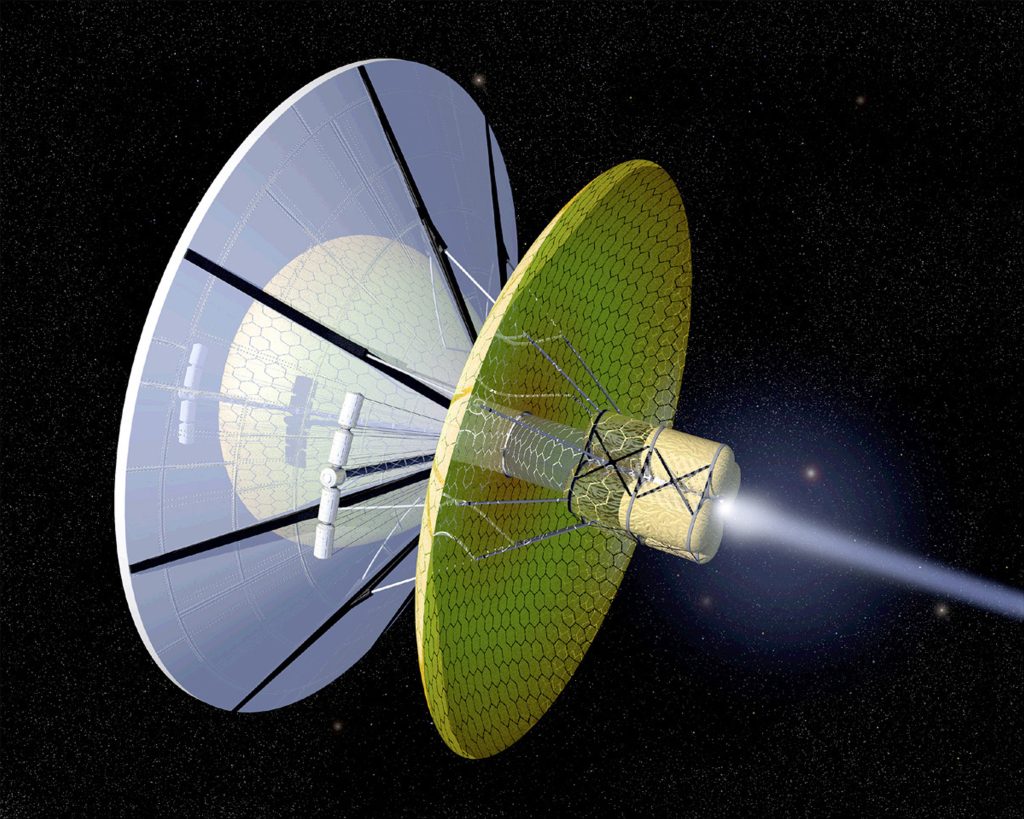

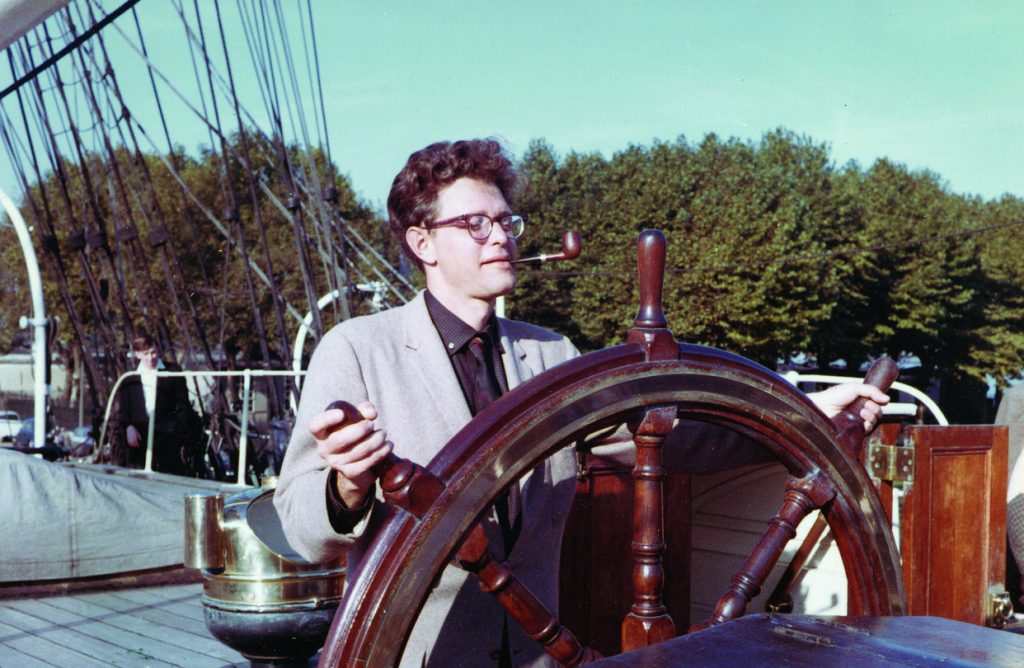

Recent comments